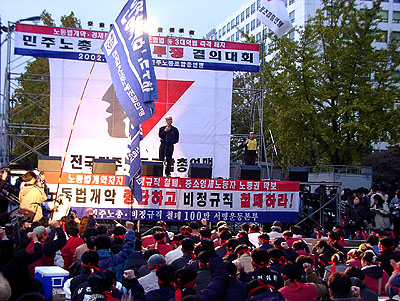KCTU and KGEU launch general strike for labor rights
The week is not over yet, but already a number of arrests, strikes, and demonstrations has shaken up the political and economic landscape in South Korea, setting the stage for a dramatic confrontation between capital and labor.
Source : Base21

by Christian and Terry Park/Base21 Media Activists
dvs-b@t-online.de
parkterry@hotmail.com
Seoul, Korea--The week is not over yet, but already a number of arrests, strikes, and demonstrations has shaken up the political and economic landscape in South Korea, setting the stage for a dramatic confrontation between capital and labor.
Last Saturday police arrested 6 leaders of the Korean Government Employees Union (KGEU), including vice president Oh Bong-sup. They were accused of helping with preparations for "illegal" strikes and participating in an "illegal" organization, since their bosses in the South Korean government does not recognize KGEU as a legetimate representative of government workers.
Since their establishment in March, the KGEU has been fighting for three labor rights--official acceptance as a "union" and not an "association" (which would strip them of independent political movement), improved working conditions, and legalization of labor actions.

So in a bold and historic move, the KGEU carried out their plan to go on a two-day strike, the first time government workers walked out since the birth of the Republic of Korea in 1948. On Monday, UPI reported 30,000 government workers from all over the country converged on the capital to demand their basic labor rights
However, in a sudden turn of events, 2,000 riot police violently stormed Hanyang University on Monday night and arrested 770 government workers and student supporters, mainly members of "All Together", a radical youth organization affiliated with the Democratic Labor Party. The workers and students had gathered at the campus to hold a KGEU planning meeting and were quickly overwhelmed by the baton and shield-wielding policemen. According to a UPI report, several were injured, including a newspaper photographer.
In order to protect against a repeat of Monday night's setback, the Korean Confederation of Trade Unions seized the umbrellaship for the second day of KGEU's demonstation. The KCTU also planned to launch their own separate strike and demonstration against the government's proposed revision of the Labor Standard Act dealing with the controversial introduction of the five-day workweek. According to the militant labor confederation, the proposed government-drafted bill has many loopholes, including the loss of three to four public holidays, the reduction of monthly and yearly paid leaves, unpaid overtime, and a change from paid monthly-cycle leaves for women to nonpaid.

On Tuesday, in a strong and powerful display of worker and student solidarity, 8,000 to 10,000 workers from the public sector, automobile, steel, and chemical, along with members of the Socialist Party, the DLP, All Together, and other university groups marched side by side from Yeongdeungpo subway station to the National Assembly at Yeoido Island. The KCTU also announced that they will strike until the government revokes the flawed five-day workweek bill and halts oppression of labor rights.
According to the Korean Herald, a total of 120,000 unionists are now on strike, representing 166 manufacturing companies and the nation's three largest car makers--Hyundai Motor, Kia Motor, and Ssangyong Motor. The Korea Metalworkers' Federation, the main catalyst of the general strike (under the auspices of the KCTU) also has crippled almost 60 auto-component makers.

The one-day-old general strike, along with the walk-out by militant government workers, the ongoing migrant worker struggle, the mostly-female hospital strike, and the burgeoning anti-war movement, not to mention the two schoolgirls killed by a U.S. army tank this past summer still fresh in the public memory, has sent strong signals to the present administration and the next one to be elected in December that the Korean people will not willingly submit to neo-liberal exploitation and neo-imperialist war games. And of course, the intensifying diplomatic showdown between the Democratic People's Republic of Korea and the United States looms over everyone's heads. Peace on the peninsula and the immediate democratization of the South, before framed as separate struggles representing conflicting revolutionary strategies, now appear to be slowly but gradually finding common ground.
Another Equality Trade Union-Migrants Branch demonstration at the Seoul immigration office on Saturday and the National Workers' Rally on Sunday will ensure the momentum does not fade.
Photos of KCTU Demonstration on November 5th



Struggle Photos of Korean Government Employee's Union







2002 / -1 / 1-
|
























